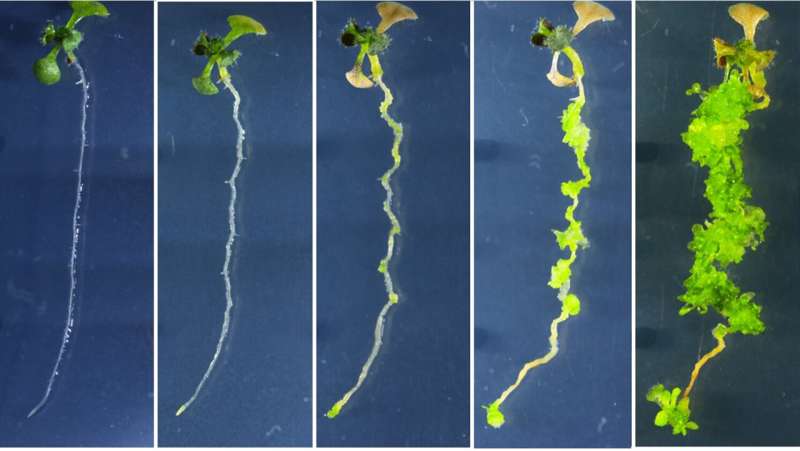Science
Researchers Develop Hormone-Free Method for Plant Regeneration

Researchers at Wageningen University & Research (WUR), in collaboration with KeyGene, have created a groundbreaking method that enables the regeneration of plant cells into complete plants without the use of added hormones. This innovative approach promises to accelerate the development of new plant varieties across various crops. The findings were published in the peer-reviewed journal The Plant Cell on November 20, 2025.
Many plants possess the remarkable ability to regenerate from a single cell into a complete organism. According to Jana Wittmer, a cell biology researcher at WUR, this process is known as regeneration. “A specific cell type, such as a root or leaf cell, can revert to an undifferentiated state—essentially becoming a stem cell. From this stem cell state, it can then develop into any type of organ,” she explained.
Advancements in Plant Breeding
Regeneration is a crucial technique in agriculture, particularly in plant breeding. Wittmer noted that it allows breeders to preserve the genetic makeup of plant varieties across generations. Traditionally, this process has relied heavily on the application of plant hormones in growth media, particularly for young plant tissues.
Yet, hormone treatments come with significant drawbacks. Wittmer emphasized that the method is labor-intensive, time-consuming, and often inconsistent. “Different plant species require distinct hormone regimes, and even within a single species, these can vary,” she stated. For crops like pepper and cucumber, effective hormone treatments are still elusive. Consequently, hormone-based regeneration can lead to increased costs and inefficiencies.
In search of a more effective solution, the research team sought to develop a hormone-free method for plant regeneration. They drew inspiration from a Nobel Prize-winning technique used in animal cells, known as induced pluripotent stem cells. Wittmer elaborated, “Our approach involves creating root stem cells through a temporary stage. We have been studying these stem cells for years and understand the critical genes involved.”
Successful Regeneration Across Multiple Species
Through a series of experiments, the researchers successfully regenerated plants without the need for hormones. The most noteworthy finding was that the process required only two specific genes to trigger regeneration. Wittmer remarked, “After introducing these genes, the plant cells autonomously organize themselves, allowing an entire plant to develop from a block of cells.” The team has demonstrated this technique’s effectiveness not only in the model plant Arabidopsis but also in economically significant crops such as tomato, lettuce, and bell pepper.
Eliminating the reliance on hormones could significantly reduce the time and effort required in plant breeding. Wittmer noted that this method could facilitate easier introduction or modification of genes, potentially enhancing plants’ resilience to diseases and pests, which could have beneficial effects on crop yields and environmental sustainability.
Wittmer cautioned, however, that the study represents just the initial step toward practical application. “While we have altered the genetic material in a lab setting, bringing genetically modified plants to market in Europe is a costly and complex process,” she said. The researchers now aim to activate the regeneration genes without resorting to genetic modification. One potential avenue is the delivery of proteins encoded by these genes directly into the plant cells.
The implications of this research extend beyond immediate applications. “This induction system opens numerous avenues for further study,” Wittmer concluded. Researchers can now explore why regeneration occurs effectively in certain cell types and plant species while remaining challenging in others. Investigating how to maintain a stem cell stage could pave the way for producing specific plant cell types, which may yield valuable pharmaceutical compounds or other beneficial molecules in the future.
The development of this hormone-free regeneration method represents a significant advancement in plant biology, with the potential to transform agricultural practices and improve food security worldwide.
-

 Science2 weeks ago
Science2 weeks agoNostradamus’ 2026 Predictions: Star Death and Dark Events Loom
-

 Technology1 month ago
Technology1 month agoOpenAI to Implement Age Verification for ChatGPT by December 2025
-

 Technology6 months ago
Technology6 months agoDiscover the Top 10 Calorie Counting Apps of 2025
-

 Health4 months ago
Health4 months agoBella Hadid Shares Health Update After Treatment for Lyme Disease
-

 Health4 months ago
Health4 months agoAnalysts Project Stronger Growth for Apple’s iPhone 17 Lineup
-

 Health4 months ago
Health4 months agoErin Bates Shares Recovery Update Following Sepsis Complications
-

 Technology4 months ago
Technology4 months agoElectric Moto Influencer Surronster Arrested in Tijuana
-

 Technology5 months ago
Technology5 months agoDiscover How to Reverse Image Search Using ChatGPT Effortlessly
-

 Technology6 months ago
Technology6 months agoMeta Initiates $60B AI Data Center Expansion, Starting in Ohio
-

 Technology6 months ago
Technology6 months agoRecovering a Suspended TikTok Account: A Step-by-Step Guide
-

 Education4 months ago
Education4 months agoHarvard Secures Court Victory Over Federal Funding Cuts
-

 Technology2 months ago
Technology2 months agoDiscover 2025’s Top GPUs for Exceptional 4K Gaming Performance











